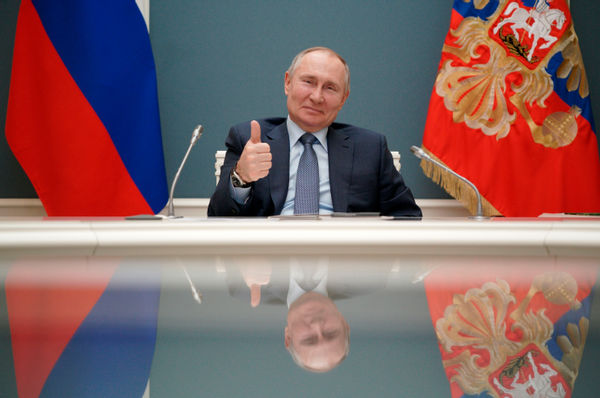The strategic relationship between the United States and Russia is among the most impacting geopolitical facets in the evolving global order otherwise recently hijacked by China. The tremors of this cyclic pendulum relationship of cooperation, competition and confrontation are thus felt far and beyond the two nations. The relationship has however taken an adversarial dip under President Joe Biden who stated that President Putin would %u201Cpay the price%u201D by accusing Moscow and Tehran of influence operations in the 2020 US presidential elections and other destabilising actions. This follows post the recent sanctions on Russia by the US over the poisoning and continued detention of Russian opposition leader Alexei Navalny. The diplomatic tiff resulted in Kremlin recalling its Ambassador for consultation of the evolving standoff and Biden%u2019s policy. The silver lining in the cloud remains the extension of the new START (Strategic Arms Reduction Treaty) by five years. Yet the challenge remains to find the fine balance between cooperation and competition, avoiding confrontation and proxies which create global instabilities.
Post the USSR collapse, the United States tried to dictate an agenda to promote democracy and a west enforced narrative on Russia. This was resented as it ignored Russia%u2019s legitimate interests, the form of government it aspired to and its place on the global stage. Russia aspires to define its security calculus not limited by its present geography, but by extending to the former Soviet Union and exercising its influence even beyond. This US refuses to accept leading to a strained relationship even though there are numerous areas of convergence like climate change, terrorism etc. Russia%u2019s annexation of Crimea, the war in southeastern Ukraine, political asylum to Edward Snowden the disgruntled NSA contractor who stole millions of classified documents and Russia%u2019s support to Syria%u2019s Bashar al-Assad in the civil war were seen as antagonistic by the US. The alleged Russian influence operations and attempt to US election interference only exacerbated the standoff by the Biden administration and has widened the gap of constructive engagement. Russia under a strong Putin is thus perceived by the US as an authoritarian state which even though weaker economically and militarily restricts US influence and national interests.
Also read: India-Pakistan Line of Control ceasefire consensus-well begun yet much to be done
As US-Russia ties plummet to a new low, Russia%u2019s growing embrace of China catalyzed by US restrictive policies and sanctions is gaining momentum. This has driven Russia – China bonhomie to a new zenith of strategic partnership of converging foreign policy outlook and mutually benefiting economic, military, technology and diplomatic engagement. However this relationship fine balances certain conflicting interests and as such is unlikely to metamorphose into a military alliance. The U.S. terms this an axis of revisionist and looks at China -Russia-Iran as a counter west alliance. Thus the United States National Security Strategy states Russia and China as threats to its national security. Russia in turn perceives the geopolitical expansion pursued by the North Atlantic Treaty Organisation and the European Union as a containment policy against Russia and a threat to its national interests.
Also read: India China disengagement – Detente, dilemmas and delusions
This thaw in the US – Russia relationship and Chinese belligerence has complicated the quadrangular equation between the USA, China, Russia and India. This has led to Russia and India recalibrating their ties with China and the US respectively. This has complicated India%u2019s balancing its ties with Russia and the US, and Russia%u2019s balancing its partnership with India and China. Traditionally, Russia has been a trusted all weather stabilisation factor in India%u2019s strategic calculus strengthening India%u2019s comprehensive national power and security concerns. Its consistent supportive role has stood the test of troubled waters and cannot be forgotten. Both nations are supportive of the idea of a multipolar world and shared economic prosperity. India too remains central to Russia%u2019s national interest and foreign policy construct. Thus robust bilateral ties and strategic partnership are in the mutual interest of both nations. However, the recent India-China Himalayan standoff put Russia in an awkward balancing position calling upon both sides to amicably resolve the border issue. Yet the tilt was conspicuous with Russia presumptuously accepting the delay in supply of S-400 to China and facilitating emergency procurements to India. Ironically the reality is while the major defence equipment acquired is from Russia, the requirement of niche technology and trade are western-oriented. The new normal will be respecting each other%u2019s vital interests and accepting the fine balancing rooted in the idea of multi-engagement partnerships. This should hold good in recalibrating inclusive relationships based on trust, understanding and mutual benefit.
Also read: Empowering defence diplomacy in the national security calculus
China%u2019s rise and it%u2019s military intrusion has endeared the India-USA strategic relationship even though certain differences remain. Yet this relationship must not lead to dependency and distancing itself from its historically trusted Russia strategic bondage nor be perceived as an alliance against China. Further, the US stated sanctions on countries that make %u201Csignificant%u201D purchases of military equipment from Russia must be reviewed by the USA with greater pragmatism of evolving geopolitics. It would be against US interests for Biden to impose sanctions on India. With the primary challenge of China, the United States needs India much more than India needs the United States. For India, the United States is a key strategic security partner and a key niche technology cum trade enabler. For the United States, India acts as a counterbalance to China and remains central to US Indo Pacific strategy and the Indian Ocean, besides the congruence of democracies in the region. India as the world%u2019s largest democracy, second largest military and fifth-largest economy, has gained global recognition as a stability factor. Even from the pragmatism of the US perspective, a resilient and strong Russian-Indian relationship will also act as a counterbalance to China%u2019s revisionism and unilateral forays in Central Asia particularly Afghanistan. From Russia%u2019s pragmatism, a sound relationship between India and the US is also preferable for accommodating and furthering understanding of Russia%u2019s legitimate interest in the global and regional canvas. Thus a strong value-based India- Russia and India-US strategic relationship is a win-win situation for all.
Also read: Indian Army: The ultimate bastion of the nation
The global canvas looks towards creating a less disruptive and unilateralist global order drifting away from universalism and revisionism towards a more collegial multilateral system. The reality is that nations are still interconnected but less globalized and a more diversified world is beginning to emerge. Thus space needs to be created for the restoration of the global economy, engagement on global common like public health, environment and trade as a part of the international community while collective deterrence through cooperative partnerships must arrest individual expansionist trends. In such a dynamic interplay, nations will have to reconcile their historical narratives and exhibit the pragmatism of a newfound global geostrategic framework based on inclusive growth. Peninsular India blessed by its geography, geostrategic location and newly found soft, sharp and hard power is thus destined to play a dominant role in the global geostrategic arena. The geopolitical path India treads must lead to greater multipolarity and multi engagements, and lesser of multilateralism and perceived alliances. Its foreign policy initiatives must thus be balanced from the lens of national interest set within a realist understanding of global contradictions to sustain an open, cooperative and rules-based order without creating dependencies or animosity through alliances.







